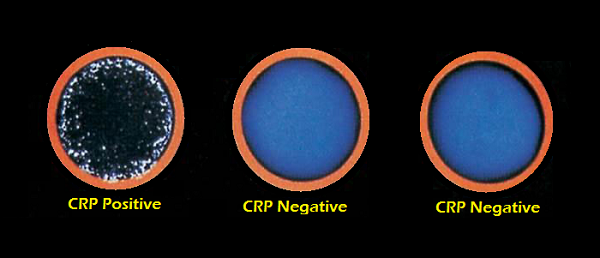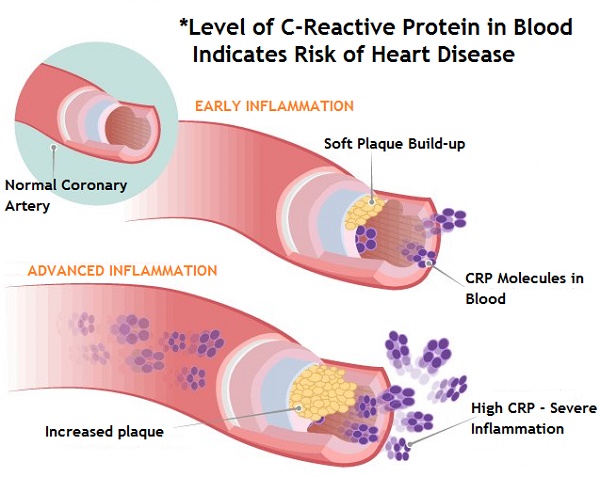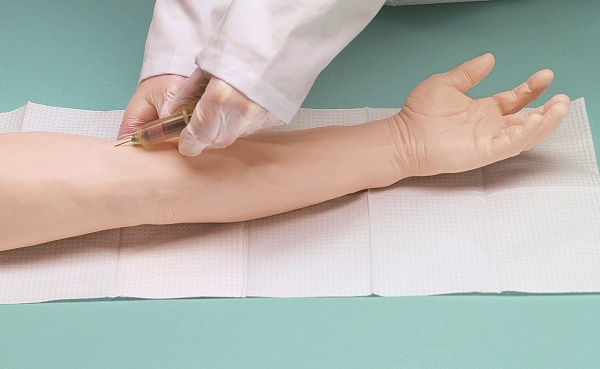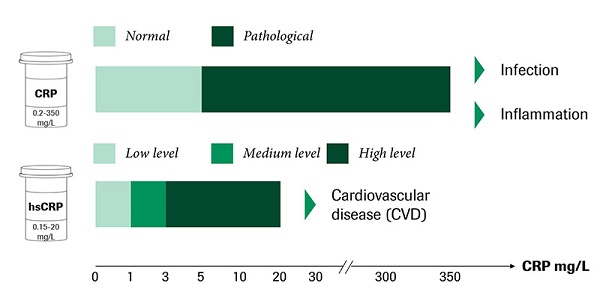C – Reactive Protein, abbreviated as CRP is one of the types of acute phase proteins produced by the liver. It is normally absent in blood and is only released in the blood within few hours after the onset of some kind of acute infection, tissue injury, or any other reason that is causing inflammation.
Inflammation experienced on body surface (fever, swelling, redness, etc.) is nothing but a generic response of tissues towards pathogens, injured cells or any other irritant. Inflammation in itself is not a disease or ailment. However, inflammation can suggest the presence of numerous disorders or diseases within the body.
To detect such inflammation and the presence of abnormal CRP content in blood, a CRP blood test is conducted. This test signifies a number of underlying deadly diseases; such as kidney failure, arthritis, pancreatitis, cardiac disorders etc.
Why is it important to opt for a CRP test?
The body can take some time before showing particular symptoms of diseases. So, waiting for symptoms can be detrimental to one’s health.
In such a scenario, opting for a CRP test is beneficial. The test results can show abnormal levels that signal the presence of certain inflammatory diseases, cardiovascular troubles, degenerative disorder, diabetes etc.
Therefore, CRP test of blood, which is a non specific inflammatory marker test, can help to determine underlying diseases and ailments within body, before they reach advanced stages; facilitating early treatment and cure.
CRP Test – Sensitive indicator of Acute Phase Reaction:
Medically, the process in which Acute phase proteins; such as CRP, undergo a change in plasma concentration, for responding to external stimuli is known as Acute Phase Response or Acute Phase Reaction.
Acute Phase Response is considered as the body’s early defense to traumas, stress, infection etc. CRP is the most sensitive of all acute phase proteins. It is because of this reason that CRP tests serve as the quickest and thus, one of the popular non specific inflammation marker tests.
Non specific implies that a CRP test can very quickly reveal the presence of inflammation somewhere within the body; however, it cannot determine the exact location. Nevertheless, CRP tests are always ordered in combination with other blood tests and these together diagnose specific ailments.
Primarily, Acute phase proteins are of two types; namely:
Positive acute phase proteins –
Plasma concentration increases as a response to inflammation.
Negative acute phase proteins –
Plasma concentration decreases as a response to inflammation.
CRP is a positive acute phase protein. This indicates that the CRP content in blood increases during inflammation and thus gets detected during the CRP blood test.
When do doctors order for CRP Tests?
There are a multitude of scenarios in which doctors do order for CRP tests. Some of them have been mentioned below:
-
Checking for infections after surgery:
Patients who undergo surgeries normally have high CRP levels for 48 hours post surgery which later falls down. Therefore, CRP tests are conducted 3 days after surgery. If by any chance CRP tests performed after 3 days show positive results, the patients are said to have developed certain infections that require immediate medical attention.
-
Tracking infections and inflammation:
Doctors order for CRP tests so as to keep track of infections or inflammations which may signal to serious health disorders such as Cancer, arthritis, infections of bone etc.
-
Body response to treatments:
CRP tests can also help to determine body response to treatment procedures. Based on these reports, relevant changes are adopted.
-
HS – CRP for Cardiovascular diseases:
Advanced CRP tests are performed to detect patients who are susceptible to heart disorders. Today, most physicians rely on High sensitivity CRP(HS CRP) testing over standard procedures to detect cardiovascular diseases. HS CRP can measure very minute levels of CRP content; precisely, 0.3mg/Lt of CRP in blood.
Cardiovascular diseases related to CRP tests:
Recent research and studies have shown that CRP test can reveal risks of underlying cardiovascular diseases; such as heart attack and strokes.
Standard CRP test can measure CRP content ranging between 3 – 5 mg/L. It is helpful in determining quite high levels of CRP content in blood. It helps in confirming the presence of certain inflammatory diseases within body.
However, to detect risk factors of cardiovascular diseases, a CRP content of less than 1mg/L needs to measured. Thus, this necessitates use of a more advanced version of CRP tests known as High Sensitivity CRP (HS-CRP) tests as explained in the above section
CRP and the HS CRP test are mostly used as synonyms, as they have a very minute difference between the two.
So to summarize, people having high CRP content can benefit from regular CRP tests and those who have minute CRP concentration need to opt for HS CRP. This mostly relates to heart disorders.
CRP Test – Procedure and Preparation:
CRP test is a simple procedure carried out at a diagnostic center or clinic. The blood sample taken for a CRP test is usually drawn from a vein, located either on the inside of your elbow or from the back of your hand.
No prior precautions, such as fasting hours or related instructions are associated with this blood test procedure.
However, more than often, CRP test is conducted with other related diagnostic tests such as Cholesterol test or any other test, that require certain preparation and precautions to be followed. Therefore, prior precautions related to these tests needs to be followed before a CRP test in situations that necessitate other tests along with it.
Besides, some drugs may hinder the test results. Therefore, informing doctors and clinical associates about medicines you use is equally crucial.
After the procedure, patients can very well get back to their regular day to day activities. However, if any kind of pain, dizziness or continuous bleeding is experienced; visiting a doctor immediately is suggested.
Who can undergo CRP test?
From newborns to adults, CRP tests are available for all. The only difference is that, when the test is conducted for new borns, venous punctures are not carried out. The blood sample is drawn from the heel.
As babies are prone to infections, leading to inflammatory diseases, a CRP test for new born is almost mandatory. New born babies are unable to speak and communicate exact problems and irritation. Therefore, a CRP test along with other tests is important to protect infants from serious health disorders.
CRP Test Result – Normal to alarming levels:
CRP is measured in milligrams per liter of blood(mg/lt). As already mentioned, CRP tests conducted precisely to detect heart disorders are known as HS-CRP tests. Below mentioned are normal and alarming CRP levels related to Cardiovascular diseases.
HS-CRP Test Results for Cardiovascular Diseases:
Normal levels:
CRP level below 1mg/L
A CRP test report showing CRP levels below 1mg/L suggests that patients are at low risk of cardiovascular diseases. This is a normal range and the most desired value.
Intermediate levels:
CRP level between 1 – 3mg/L
A CRP test report showing CRP levels between 1 – 3mg/L suggests that patients are at moderate risk of Cardiovascular diseases.
High Risk Levels:
CRP level above 3mg/L
A serious condition where patients are at high risk of cardiovascular diseases.
Very Acute Levels:
CRP level above 10mg/L
Indicates acute inflammation and high susceptibility of patients to heart attacks and strokes.
High CRP levels calls for related tests to confirm the result and thereafter related treatment procedures are carried out.
What does a positive CRP test indicate?
Besides diseased heart conditions; a positive or high C Reactive protein level may indicate the presence of number of other ailments: Some of these are:
- Pelvic Inflammatory disease
- Bowel diseases
- Osteomyelitis – a severe condition of bone infection
- Tuberculosis and Pneumonia
- Lupus or other autoimmune diseases
- Rheumatoid Arthritis
- Cancer
Excessive inflammation and thus high CRP levels can also be obtained when patients are suffering from high blood pressure or blood sugar. Severe smoking can also cause extensive inflammation and thus high CRP levels in blood. Obesity can also be a primary reason of elevated CRP levels.
It needs to be noted that women in their later stages of pregnancy may have high CRP levels. Therefore, your doctor may order for a CRP test to carry out related procedures.
CRP test results are not the ultimate decision makers. A high CRP level is only a suggestion to undergo other advanced procedures to determine a particular disease or ailment.
How to treat positive CRP levels?
As high CRP levels serve as an indicator of certain infections or ailments within body; its treatment also relates to treating those factors that are causing unwanted elevation of CRP levels.
Some of the measures that can help to treat high CRP levels have been listed below:
- Exercise and appropriate diet to keep body weight under control
- Abstaining from smoking is highly recommended
- Use of statins to lower cholesterol levels
- Patients with Cardiovascular diseases can benefit from use of aspirin
- Medicines to control diabetes can also help to reduce CRP levels
- In case of babies, medications that can treat infections leading to high CRP levels show significant results once the infection disappears
With advanced study and research taking place in the Science and Medicine domain, CRP test has grown from diagnosis procedure to risk assessment. Especially, in cases of Cardiovascular diseases and Cancer that are related to inflammation, CRP test plays a major role in monitoring treatment procedures.
CRP blood test is available with almost all diagnostic centers in major cities, at very affordable prices, you can get the list here. Therefore, visit your nearest diagnostic center to know your CRP levels today!





